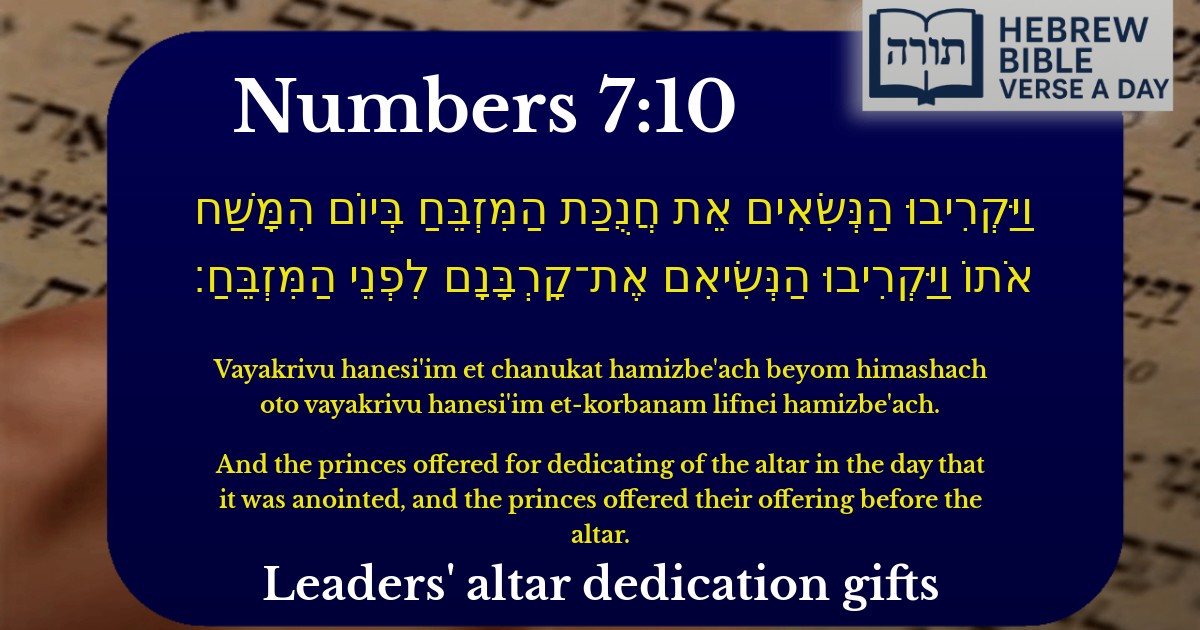Join Our Newsletter To Be Informed When New Videos Are Posted
Join the thousands of fellow Studends who rely on our videos to learn how to read the bible in Hebrew for free!
Hebrew Text
וַיַּקְרִיבוּ הַנְּשִׂאִים אֵת חֲנֻכַּת הַמִּזְבֵּחַ בְּיוֹם הִמָּשַׁח אֹתוֹ וַיַּקְרִיבוּ הַנְּשִׂיאִם אֶת־קָרְבָּנָם לִפְנֵי הַמִּזְבֵּחַ׃
English Translation
And the princes offered for dedicating of the altar in the day that it was anointed, and the princes offered their offering before the altar.
Transliteration
Vayakrivu hanesi'im et chanukat hamizbe'ach beyom himashach oto vayakrivu hanesi'im et-korbanam lifnei hamizbe'ach.
Hebrew Leining Text
וַיַּקְרִ֣יבוּ הַנְּשִׂאִ֗ים אֵ֚ת חֲנֻכַּ֣ת הַמִּזְבֵּ֔חַ בְּי֖וֹם הִמָּשַׁ֣ח אֹת֑וֹ וַיַּקְרִ֧יבוּ הַנְּשִׂיאִ֛ם אֶת־קׇרְבָּנָ֖ם לִפְנֵ֥י הַמִּזְבֵּֽחַ׃
וַיַּקְרִ֣יבוּ הַנְּשִׂאִ֗ים אֵ֚ת חֲנֻכַּ֣ת הַמִּזְבֵּ֔חַ בְּי֖וֹם הִמָּשַׁ֣ח אֹת֑וֹ וַיַּקְרִ֧יבוּ הַנְּשִׂיאִ֛ם אֶת־קׇרְבָּנָ֖ם לִפְנֵ֥י הַמִּזְבֵּֽחַ׃
🎵 Listen to leining
Parasha Commentary
📚 Talmud Citations
This verse is quoted in the Talmud.
📖 Sotah 36b
The verse is referenced in a discussion about the dedication of the altar and the offerings brought by the princes.
📖 Menachot 72b
The verse is cited in the context of discussing the laws and significance of the offerings made by the princes during the dedication of the altar.


Context of the Verse
The verse (Bamidbar 7:10) describes the offerings brought by the nesi'im (princes of the tribes) during the dedication of the Mizbe'ach (altar) after its anointment. This event took place during the inauguration of the Mishkan (Tabernacle), marking a significant moment in the spiritual dedication of the sanctuary.
Rashi's Explanation
Rashi (Bamidbar 7:10) notes that the repetition of the phrase "וַיַּקְרִיבוּ הַנְּשִׂיאִים" ("and the princes offered") emphasizes their eagerness and voluntary participation in bringing their offerings. The first mention refers to their initial decision to contribute, while the second describes the actual act of bringing their sacrifices before the altar.
Midrashic Insights
The Midrash (Bamidbar Rabbah 12:16) elaborates that the nesi'im delayed bringing their offerings until the altar was fully anointed, demonstrating their humility. They did not wish to presume the privilege of being first but waited until the proper time. Their offerings were thus brought "בְּיוֹם הִמָּשַׁח אֹתוֹ" ("on the day it was anointed"), signifying alignment with divine timing.
Rambam's Perspective
Rambam (Hilchot Ma'aseh HaKorbanot 3:2) discusses the significance of the altar's dedication, explaining that the offerings of the nesi'im established a precedent for communal sacrifices. Their voluntary contributions underscored the principle that leadership in avodah (service to Hashem) requires both generosity and adherence to halachic procedure.
Symbolism of the Offerings